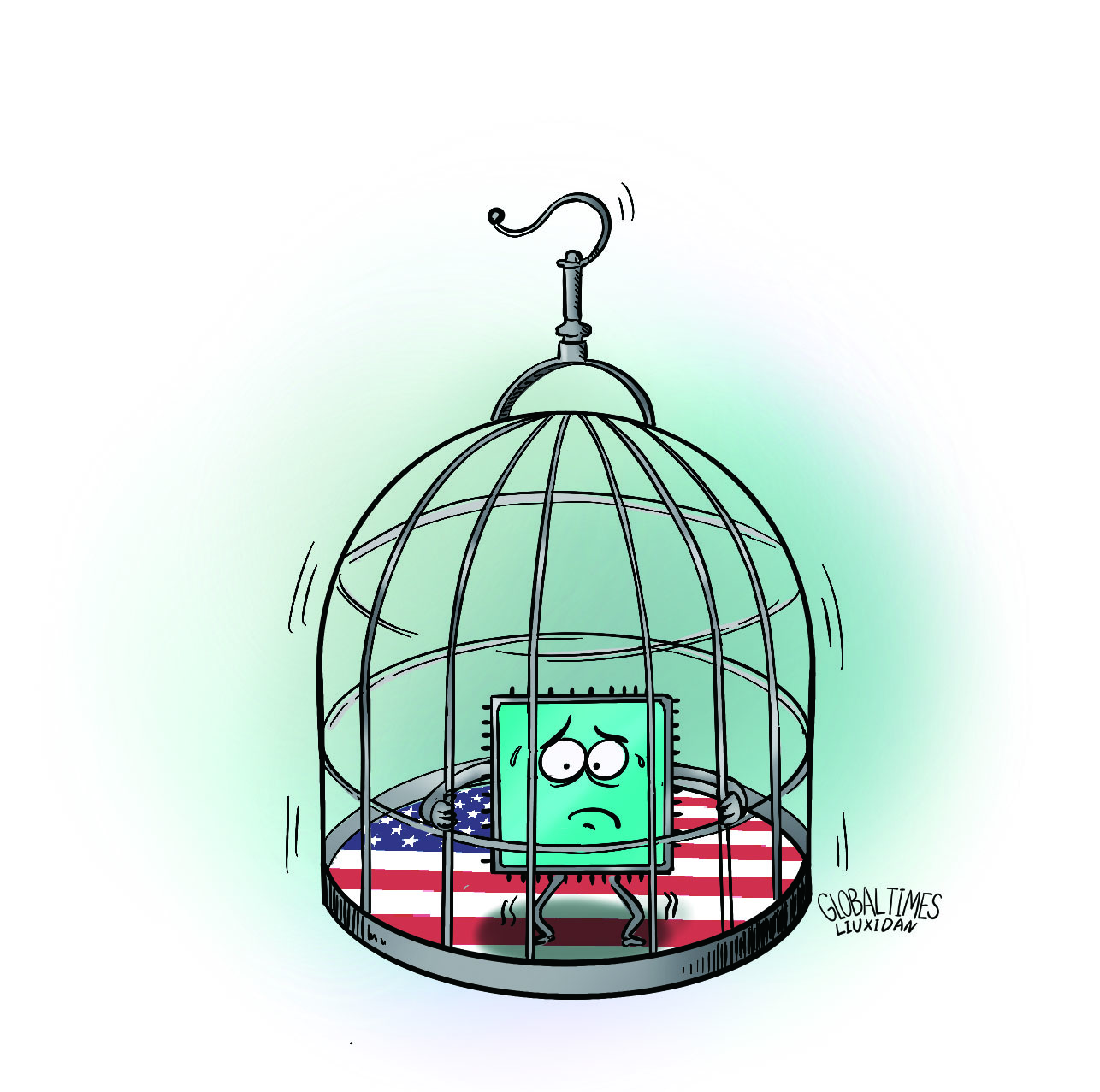
Illustration: Liu Rui/Global Times
In October 2022, the Bureau of Industry and Security of the US Department of Commerce issued new export control rules, prohibiting the export of integrated circuits, supercomputers and other products from the US to China, in addition to prohibiting the export and re-export of related products produced in other countries to China, and prohibiting Americans from engaging in activities that may contribute to China's research and development of integrated circuits.The new round of export control rules were released almost at the same time as the Biden administration's 2022 National Security Strategy, which claims that the post-Cold War era is definitively over and a competition is underway between the major powers to shape what comes next, that China is the only competitor with both the intent to reshape the international order, and that China represents America's most consequential geopolitical challenge.
Prior to this, in August 2022, US President Joe Biden signed the "CHIPS and Science Act of 2022" and other bills into law. These laws not only provide subsidies for US companies to develop and produce chips, they also restrict activities involving the expansion of China's semiconductor production capacity, prohibiting Chinese companies from participating in planned projects linked to US research institutions, and prohibiting universities that have cooperative relations with China from obtaining related research and development funds.
The above-mentioned US legislation, administrative measures and strategies have not only the expanded and strengthened existing practices, but also represent a major shift in US policy toward China in the current geopolitical environment.
The US export control measures on integrated circuits and other products are super-strong escalation of the previous measures against Huawei. In May 2020, the Bureau of Industry and Security of the US Department of Commerce revised the export control rules to specifically apply to Huawei and its affiliates in China, prohibiting the export and re-export of related items produced outside the US to Huawei and its affiliates. The amendment redefines "foreign direct product," adds the factor of "end user," increases exporters' "informed" requirements, and includes Huawei's overseas branches outside the US on the list of prohibited export entities.
The new restrictions in October 2022 extended the previous Huawei-specific control measures to 28 other companies in China. As an increasing number of Chinese companies and their affiliates are included in the "entity list" (blacklist), the original measures against Huawei linked companies have been escalated to measures against more Chinese companies, including related products, technologies and corporate events. The spillover effects of these controls have been enormous. The measures can be seen as the cut off of supply of related products to China.
The US' latest export control measures are targeted escalation of the Foreign Direct Product Rules. For the export or re-export of products produced outside the US, US export control measures are mainly managed through two aspects. First, to restrict the export of US-origin components assembled into finished products, stipulating the content ratio of US-origin parts. Second, restricting the export of products made outside the US using propriety technology, software, or equipment, extending export controls on US products to products made in other countries.
The new US export control measures to China mainly strengthen and expand the second aspect. This kind of control measures on foreign products used to be mainly aimed at a handful of countries including Cuba, North Korea, and Libya. The policy toward China was relatively flexible, meaning China was relatively less affected. The new measures taken by the US directly target China, so that manufacturers and exporters located outside the US that use American technology, software or equipment to produce related items will not dare to export related items to China due to the threat of US sanctions. This may cause companies in certain countries and regions to join US companies in refusing to export or re-export related items to China, which may form a blockade against China.
The new export control measures adopted by the US against China are in direct violation of the WTO's obligations including Most-Favoured-Nation treatment and prohibition of Quantitative Restrictions. The Chinese government has every right to launch a lawsuit to the WTO dispute settlement mechanism in accordance with WTO rules and win the support of other WTO members.
However, we have seen that these measures of the US are taken against the background of the US undermining the WTO dispute settlement mechanism, which can no longer effectively handle disputes among WTO members. It is a major feature of this wave of US export control measures against China that the US has unscrupulously taken unilateral and illegal measures while undermining multilateral mechanisms.
The US' deeds not only hurt China's interests, but also shows contempt for the WTO mechanism. It has hurt the WTO members' trust in the WTO multilateral mechanism and their efforts to maintain the multilateral mechanism. The majority of WTO members originally pinned their hopes on the Biden administration to reverse the unilateral behavior of the Trump administration, but now this hope has also been shattered by the Biden administration's escalated measures. The Biden administration also does not follow real multilateralism nor defend the multilateral mechanism of the WTO.
Although the foreign direct product export control policy implemented by the US is aimed at China and Chinese companies, it also directly affects the interests of other relevant countries and companies. It is a typical case of US long-arm jurisdiction. Many countries in the world, including European countries, have always opposed the US' abuse of extraterritorial law, and even counteracted it with blocking legislation. In the face of strong resistance from other countries, the US sometimes shows a certain degree of restraint or immunity in the scope of use. This shows that the US government also realizes that this practice is unpopular and lacks international legitimacy.
The US government uses the so-called Foreign Direct Product Rules to control the production, operation, research and development, trade and other economic activities of enterprises around the world, which does not conform to the rules of intellectual property rights, nor the rules of competition, nor the rules of the market. Yet, these rules are precisely the rules that the US government vigorously promotes and upholds both domestically and internationally. This is yet another example of Washington's double standards. The US government intervenes in market operation rules and corporate autonomy, resulting in the monopoly of American companies, American products, and American technologies in the world, and direct violation of corporate interests from other countries.
All countries around the world should unite and use existing international mechanisms to fight against the US in a reasonable, beneficial and restrained manner, resist the hegemony of the US, and work hard to promote the formulation of more fair and just multilateral rules. International organizations such as the WTO and the UN have their own powers and responsibilities to maintain the international economic order and peaceful order, and they all play unique roles within the scope of their respective systems.
China should work with other countries to take measures to safeguard international order and international legitimate rights and interests, safeguard the autonomy of countries in foreign exchanges, and safeguard the legitimate interests of enterprises. Against such political hegemony and economic bullying by the US, we must have the courage to voice our opposition, safeguard due rights and interests through existing international organization mechanisms, and promote the international community to form more fair and just international rules. And international occasions such as the UN Security Council and the UN General Assembly can be platforms where China and other countries uphold international justice and oppose hegemony and bullying.
The author is a professor with Renmin University of China Law School. bizopinion@globaltimes.com.cn


